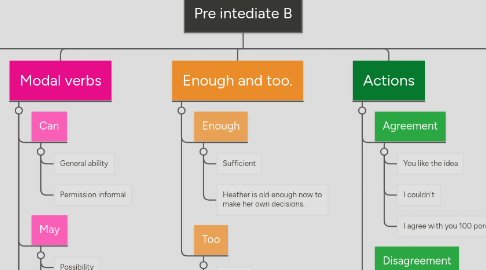
1. Future arrangements
1.1. present continuous
1.1.1. We’re flying to Luxor to meet the boat.
1.1.2. We’re flying to Luxor to meet the boat.
1.2. present simple
1.2.1. The boat leaves at dawn
1.2.2. future timetabled event
1.3. future simple
1.3.1. We’ll probably find it very hot
1.3.2. We’ll probably find it very hot
1.4. going to future
1.4.1. We’re going to visit as many ancient sites as possible
1.4.2. an intention
1.5. The future continuous
1.5.1. This time tomorrow, I’ll be travelling through France.
1.5.2. Events or actions that will be in progress at a specific time in the future
1.6. The future perfect simple
1.6.1. By the year 2008, I’ll have left school and started work
1.6.2. Events or actions that will be in progress at a specific time in the future
1.7. Shall
1.7.1. In a few days we shall have forgotten about the misunderstanding.
1.7.2. Shall is sometimes used instead of will after I and we.
2. Modal verbs
2.1. Can
2.1.1. General ability
2.1.2. Permission informal
2.2. May
2.2.1. Possibility
2.2.2. Permission formal
2.3. Must
2.3.1. Certainty
2.3.2. Necessity
2.4. Could
2.4.1. Past of can
2.4.2. Make a request
2.5. Should
2.5.1. Advice
2.5.2. After suggest, propose, recommend, insist, demand.
2.6. Would
2.6.1. Future in the past
2.6.2. Unreal action
3. Actions
3.1. Agreement
3.1.1. You like the idea
3.1.2. I couldn't
3.1.3. I agree with you 100 porcent.
3.2. Disagreement
3.2.1. You deslike the idea
3.2.2. I don't think so
3.2.3. No way (strong)
4. Countable and Uncountable Nouns
4.1. Countable
4.1.1. Countable nouns are individual objects, people, places, etc. which can be counted
4.1.2. a friend, a house, a few apples, lots of trees, etc.
4.2. Uncountable
4.2.1. Uncountable nouns are substances, concepts etc that we cannot divide into separate elements. We cannot "count" them
4.2.2. music, art, love, happiness advice, information, news furniture, luggage.
5. Enough and too.
5.1. Enough
5.1.1. Sufficient
5.1.2. Heather is old enough now to make her own decisions.
5.2. Too
5.2.1. Excess
5.2.2. You are too young to understand.
6. Adjective -ed and -ing
6.1. -ing
6.1.1. cause
6.1.2. Most sequels are disappointing.
6.2. -ed
6.2.1. effect
6.2.2. The whole school was sadded by the tragic event.
7. First conditional
7.1. Probability and present.
7.1.1. If I don't get any help, I will shout you.
7.1.2. I will eat fish for dinner tonight if I catch one.

